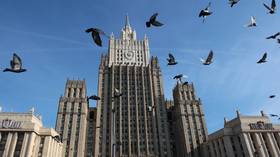Berlin slams Russian decision to shut down German state media
The decision taken by the Russian government to close down the Moscow bureau of German public broadcaster Deutsche Welle (DW) is “a new strain in German-Russian relations,” Berlin said on Thursday, in the latest installment of the ongoing diplomatic row over media freedom.
“The measures announced today by the Russian government against Deutsche Welle lack any basis,” a statement from the German Foreign Ministry said. “If these measures were actually implemented, it would significantly restrict the free reporting of independent journalists in Russia, which is particularly important in politically tense times.”
The adverse reaction in Berlin follows a decision by Moscow to withdraw the press credentials of all Deutsche Welle staff working in Russia while also shutting the company’s office in the capital.
The measures were taken following a decision by Berlin’s media regulator MAAB (Medienanstalt Berlin-Brandenburg) to force EU satellite operator, Eutelsat, to remove the 24-hour German-language RT DE channel from its platform. Russia believes this move to be illegal.
The station has been operating on certification secured in Serbia in 2021, which allowed it to broadcast in various countries, including Germany, under the European Convention on Transfrontier Television (ECTT), of which both Berlin and Belgrade are signatories. The German authorities, however, dismissed this as worthless.
According to Berlin, Russia’s retaliation is a “total overreaction.” In a public statement, the German Foreign Ministry stated that they refused to accept a comparison between DW and RT DE, and thereby could not justify the measures on DW imposed by Moscow. The ministry also stated that, while DW journalists have operated until now in Moscow with full permission, RT DE failed to ever apply for a broadcasting license, despite one being required for broadcasters in Germany.
According to RT, Berlin has no grounds to compel RT DE to apply for a license in Germany, because the majority of the staff, production, and editorial decisions are made in Moscow. Furthermore, Germany does not grant licenses to any publicly funded broadcasters, foreign or domestic, and therefore applying would be futile.
Speaking on Wednesday, RT’s deputy editor-in-chief Anna Belkina stated that the permission obtained by Serbia should have been sufficient for the German regulator, noting that the case will be taken to court.
“The channel does have a license obtained in a fully legitimate way,” she said. “We believe we have good grounds to win this fight.”
The latest row comes against the backdrop of increasingly bad relations between Russia and the West, as tensions rise on the Ukrainian border. However, Berlin has been willing to cooperate more with Moscow than the majority of other EU capitals, as displayed by the recent completion of the controversial Nord Stream 2 gas pipeline and a recent announcement by Chancellor Olaf Scholz that he is looking for a “fresh start” in relations with Germany.






Comments are closed.